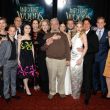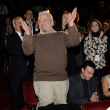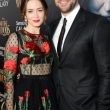“Into the Woods” is a modern twist on several beloved fairy tales, intertwining the plots of a few choice stories and exploring the consequences of the characters’ wishes and quests.
This humorous and heartfelt musical follows the classic tales of Cinderella (Anna Kendrick), Little Red Riding Hood (Lilla Crawford), Jack and the Beanstalk (Daniel Huttlestone), and Rapunzel (MacKenzie Mauzy), all tied together by an original story involving a Baker and his Wife (James Corden and Emily Blunt), their wish to begin a family and their interaction with the Witch (Meryl Streep), who has put a curse on them.
Read what some of the cast and creatives had to say about the film.
What did you and Rob have in mind when writing “Into The Woods” and why do you think it resonates?
James Lapine: Well, first part’s kind of a hard one to answer ‘cause, you know, we weren’t sure what we were doing. It wasn’t like this was an idea that we had and then started writing. We got together, we’d just shoot the breeze because we wanted to write another show, I’d say, ‘Well, what do you want to do?’ He said, ‘I want to do like a quest journey, you know, like Galahad or The Odyssey or Wizard of Oz.’ I went, ‘Oh, that’s interesting,’ and he said, ‘What do you want to do?’ I said, ‘I want to write a plot,’ because as a writer, I had never really written anything with a lot of plot. So that’s where we started and then I also had a real fascination with fairytales. I’m gonna make this really fast, went off, tried to write an original fairytale, discovered that it wasn’t really very easy because fairytales are really short and then I sort of hit on this idea of combining writing one original fairytale, The Baker and the Wife, and then weaving them together with the existing fairytales, and so that’s how it all kind of went from there. I think the resonance is always a surprise, but I guess fairytales have lasted quite a long time, and I guess our show, because of that, has it at the core, is sort of timeless because people are still reading them and then reading them to their kids. They have a different perspective to them as they get older and there’s always a giant, and [the] giant just keeps changing, so that’s kind of why I think it’s stuck around.
Musicals have been so different from other genres, are they more difficult to direct?
Rob Marshall: They’re very fragile. I mean, I feel like you’re always this far away from a Saturday Night Live sketch because if the song doesn’t come out of the story in an organic way, in a seamless way, and you feel the number beginning, it’s dangerous because of the fact that somebody’s singing. What’s so beautiful about this amazing piece that James wrote and Steve Sondheim wrote is that the material is so organic. I mean, you said this the other day, James, which I loved, which is if you pull the songs out of the piece, the piece falls apart. You know? There are musicals you can take the songs out and it doesn’t affect it at all. But what’s fantastic about this piece is it’s so interwoven. I mean, you can see that in the first 16 minutes, that opening prologue. It’s so beautifully created and written because it moves in and out of dialogue so seamlessly, but it’s very delicate, creating a musical. I feel like it’s two movies in one when I’m working on it because you have the whole side of the music, etc., and you have the rehearsals and all of that. That’s almost its own thing. Then you have the filming of it and the piece, so it’s a balancing act and the only way you can do it well is if you have great material and brilliant actors.
Your Cinderella is not the stereotypical persona of a fairytale character, was that something that attracted you to the part?
Anna Kendrick: It’s funny, that question in that exact way has come up several times and it’s not the traditional Cinderella and it’s a fascinating Cinderella, but, you know, it could have been the lamest Cinderella of all time. It’s Rob Marshall and this cast and Sondheim, and so the idea of it attracted me to the role. It’s like it’s just gravy on top of gravy on top of gravy, and Cinderella in this, to me her defining quality is bravery because she has known nothing but neglect her entire life, and then when she’s presented with a different situation, she overthinks it and she is too logical. She doesn’t listen to her heart. She wants to listen to her head or she wants to try a combination of both and I think that Rob was very interested in having a modern sensibility for these characters and I think that’s a very modern thing that women do is, you know, we cannot listen to our guts. We have to look at everything from every angle and overthink everything, and then for her to allow herself to go into this better situation, realize that it’s completely fake, the prince is so vacuous and it’s all just a façade, and then when she finds herself in a situation where her community is undergoing this great tragedy, it’s then that she can focus and say, ‘This isn’t what I want. I want something real and I don’t know what that is yet, but I’m willing to forego this safe situation to find out what that is, even though right now that’s a handful of survivors and I don’t know what will happen next.’
Everyone is talking about the line “I was raised to be charming not sincere.” How does that inform the character of the prince?
Chris Pine: Well, I think it’s a distillation of precisely who the man is. There are a couple characters in this that I think are taken from the pages of the storybook and remain pretty two dimensional even if they’re given the chance to be interesting and complex and relational, and that’s my character, and I think Christine Baranski’s character, the stepmother, and the roles we play are to reflect back. You know, here’s a guy that knows he’s being watched, he knows he is preening, every movement is kind of thought out beforehand. His journey has nothing to do with these other people that he’s so driven to be with, the Baker’s Wife or Cinderella. It’s all about this kind of inner desire to be seen and to play out this story that he’s probably been playing out in generation and generation and generation. He’s just like an LP that keeps on running itself back. And in the one moment that he’s given the opportunity to see what his effect has on Cinderella where she says, ‘Well, look at me. Look what’s happened. You’re a philandering prick.’ He thinks about it for a second. You can see that it does hurt him and he does have a moment of inner reflection but then chooses to get back on the horse and again play out the two dimensional story that he has been playing out for generations. I had a lot of fun playing a guy with big hair and a tan, and just loving himself. It was a joy.
You both have theater backgrounds, what was it like bringing it to the big screen?
Marc Platt and John Deluca: I think any musical has so many moving parts and the challenge is unifying all the moving parts in particular because you have the camera and now it’s all about adaptation and what works in one medium doesn’t necessarily work in another so the challenge is to stay as true as you can to the material and yet not be afraid to step out of it and add elements to make it satisfying cinematically.
The role of the wicked stepmother is such an iconic character in stories what was your take on the role of the stepmother and what did you bring to the role?
Christine Baranski: Well I did a lot of work with Rob and we talked about what the nature of the step mother and the step sisters and what exactly activates evil and I found that Cinderella is just in the house and does things for us … But we looked to see how can we make this trio of women resonate and depict the sense of narcissism. They look like they’re trying so hard because it’s their one shot, they’re obsessed! They’re venial and opportunistic characters.
You’re allowed to be choosey of the types of roles you take. Why did you want this one?
Meryl Streep: I was amazed when Rob said they were putting this together and they wanted me to be the witch. It’s a great piece of American theater history and for us to make a film out of it and to sing this music is really a privilege and very a high bar to come up to … so I agreed to do it and worked really hard to bring my voice back because I used to have a nice voice and to do my exercises I remembered from Yale and all those things from the olden days like clearing your sinuses … to get everything flowing, but yes to serve this man Sondheim and the beautiful music … We really all felt that imperative to do it as well as we possibly could .
The witch is the only one who didn’t lie to get what she wanted. Do you agree with this statement and what did you do to craft your character?
Meryl Streep: Yes and what makes a woman more attractive then never lying … What attracted me to me it was the music, that was the main thing. Music is the engine through which all these stories that are told and it’s sort of a wave that you can surf. When you’re an actor and there’s no music you have to bring it all yourself. I remember when I was in Broadway musical sometimes you would come to the theater 10 weeks in and it’s a Tuesday and you’re hungover or whatever from the day off and just don’t feel like it, you’re putting on the makeup and then suddenly through the box comes the overture and the sound of the music and it just lifts you.
Check out some photos from the World Premiere presented by Samsung Galaxy.
The film hits theaters Christmas Day.





